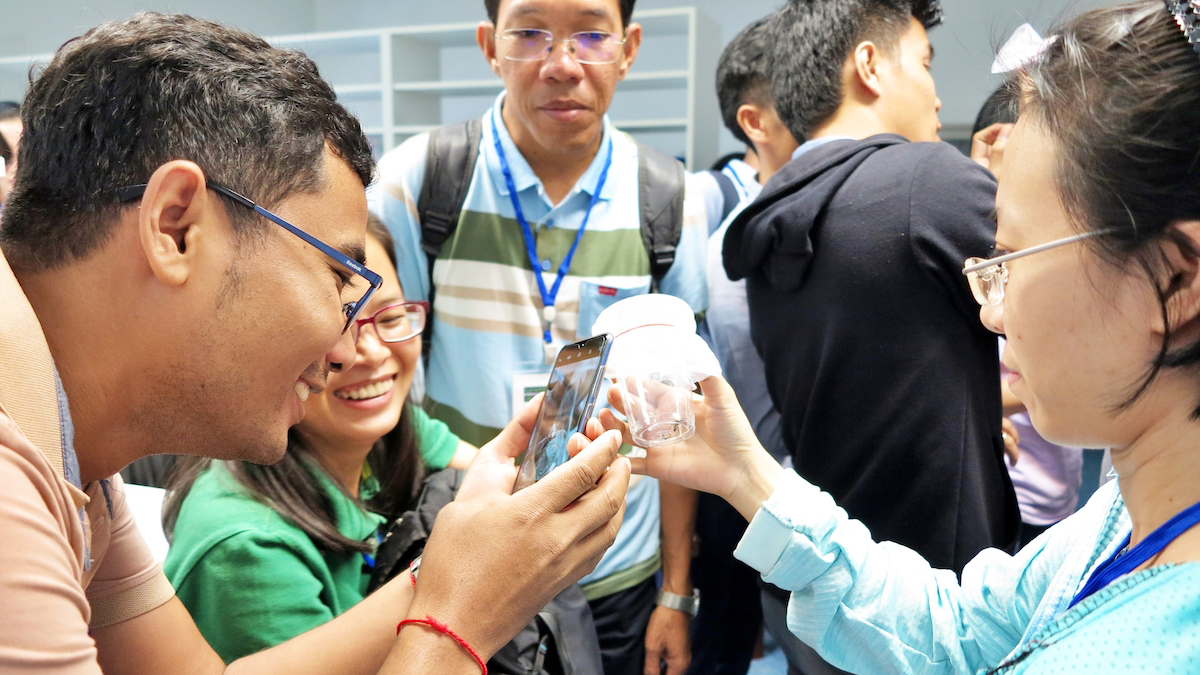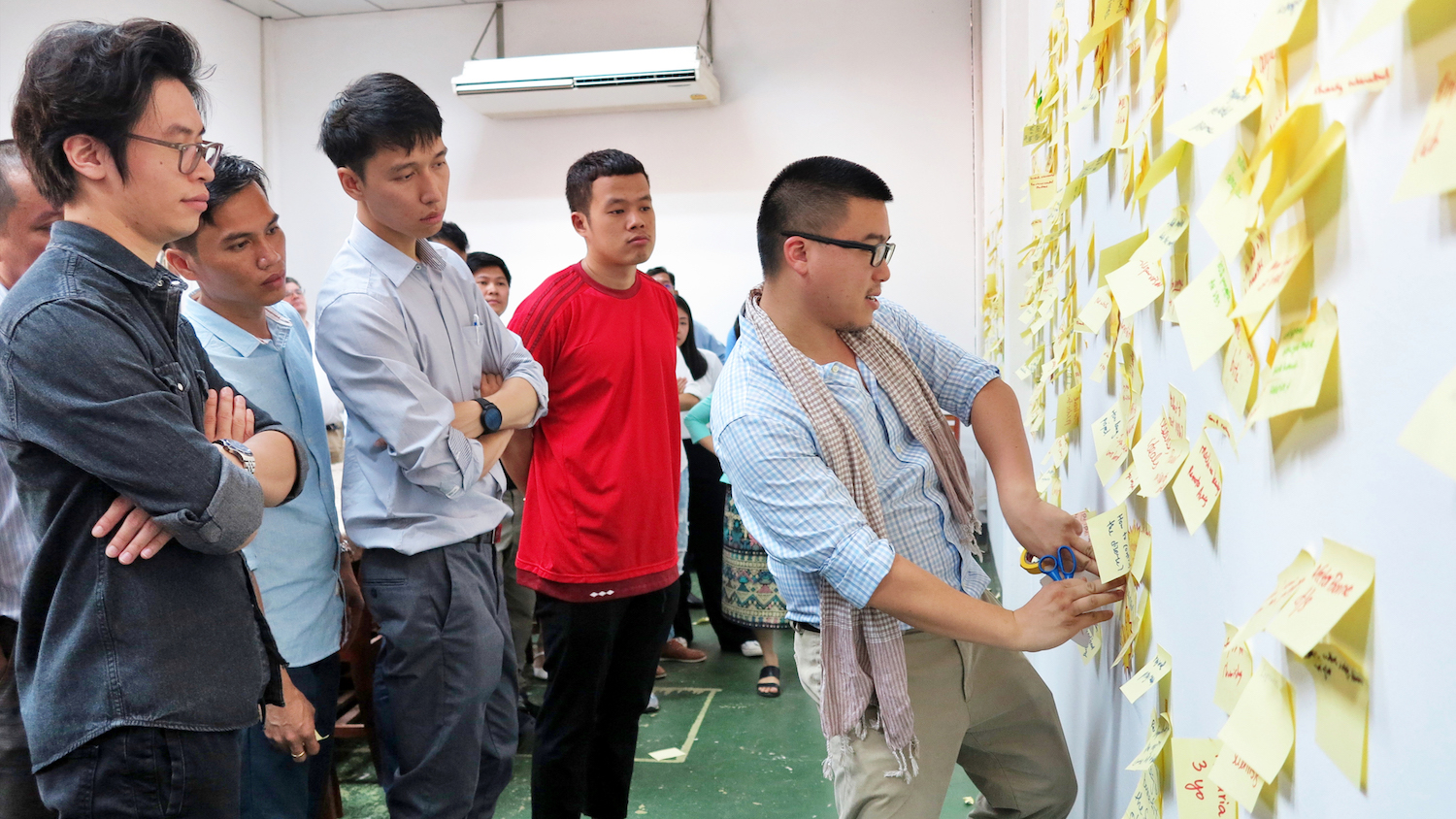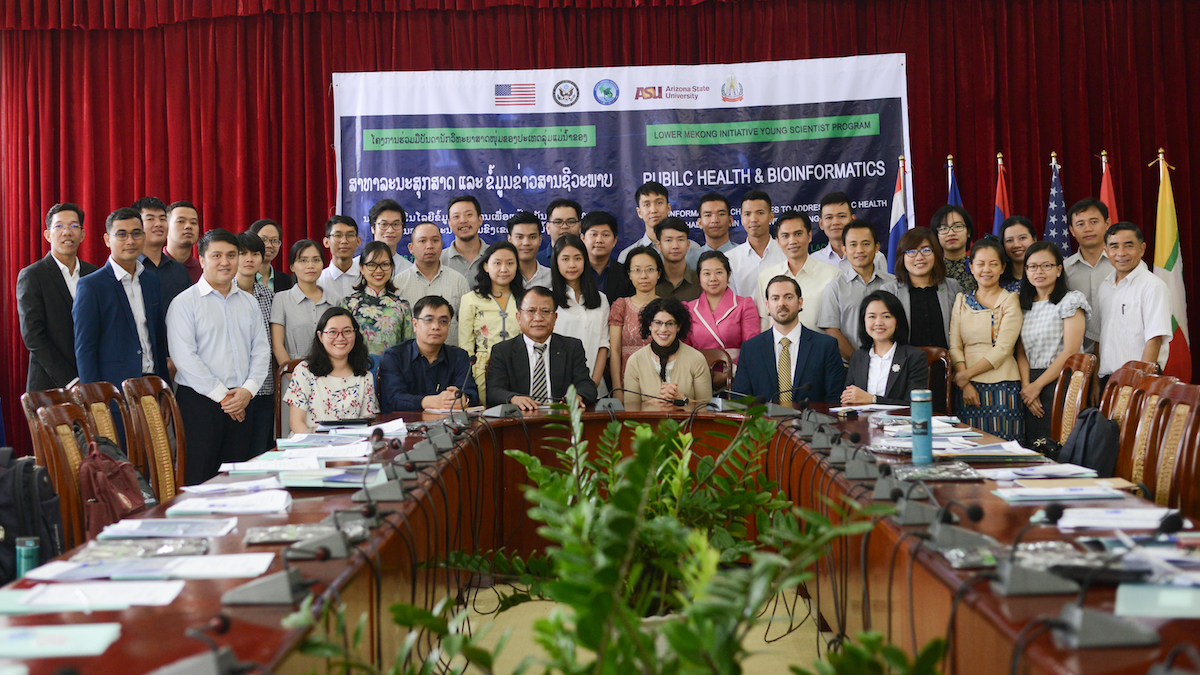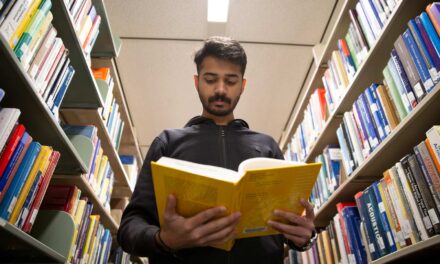
Young scientists explore public health and bioinformatics in Southeast Asia

Above: Participants in the Lower Mekong Initiative Young Scientist Program analyze different species of mosquitoes during their different stages of their life-cycle at the entomology lab of the Pasteur Institute of Laos. Photo courtesy of Jose Quiroga
The Lower Mekong Initiative and Arizona State University launched year two of the LMI Young Scientist Program with funding from the U.S. Department of State. In its second year, the young scientists will address public health challenges in the Lower Mekong region using information technology and bioinformatics.
“The LMI Young Scientist Program is a great example of how science diplomacy programs can convene multi-country researchers and scientists to develop professional relationships for collaborative projects, but also convene around common problems in their countries with linkages to U.S. counterparts and programs,” said Jeffrey Goss, associate vice provost of Southeast Asia for ASU and executive director of Global Outreach and Extended Education in the Ira A. Fulton Schools of Engineering.
Inside the LMI four-week technical program
Hosted by the National University of Laos in Vientiane, the LMI Young Scientist Program focused on the delivery of skill-building workshops and included the participation of 33 early-career scientists and researchers from the five member countries of the LMI: Cambodia, Laos, Myanmar, Thailand and Vietnam.
The workshops were aimed at enabling young scientists to work on multidisciplinary projects using information technology, computer science and bioinformatics toward research initiatives and new technology development that address public health challenges in the Lower Mekong region.
The first week of the program introduced participants to the main public health issues related to vector borne diseases and current regional programs to combat these issues. The second week included a “design thinking” workshop, led by experts from the School of Global Studies at Thammasat University, Thailand.
During the workshop, the scientists were introduced to the human-centered design methodology – an iterative process seeking to understand final users, challenge assumptions and re-define problems in an attempt to identify alternative strategies and solutions, which were not initially apparent.

Hermes Huang (right), lecturer from Thammasat University, guides participants through the design thinking process. Photo courtesy of Jose Quiroga
“Design thinking provides a solution-based approach to solving problems; it is a way of thinking and working as well as a collection of hands-on methods,” Hermes Huang, lecturer at the School of Global Studies, Thammasat University, Thailand.
The scientists were also invited to the Pasteur Institute of Laos to attend a mosquito identification workshop at the entomology lab, where they learned about innovative traps to reduce the population of disease-carrying mosquitoes.
The second week concluded with a field trip to the Lao province of Savannakhet where the participants visited the Department of Communicable Disease Control of the Provincial Health Offices. Theyconducted fieldwork at the Tonhen Village, Xaybouly District to follow up with patients suffering from dengue fever and participated in mosquito and larvae collection activities. These mosquito and larvae samples were then analyzed at the entomology lab in Savannakhet to identify the species of mosquitoes found in the village.
After the second week, the young scientists were grouped into six teams. Each team was encouraged to use design thinking models, computational methods and information technologies to clearly define and propose solutions for public health challenges in the Lower Mekong Region caused by vector-borne diseases.
“I have been working in public health area, and my works have had its focus just on immunization,” said Souliya Channavong, a researcher from Laos. “I had no idea about the severity of dengue outbreak in Laos before I joined the program. LMI opened my perspectives on very important issues such as vector-borne diseases control and prevention. I got to meet brilliant entomologists from Cambodia and learned from them how to identify mosquitos. And I got to meet a mathematician from Thailand who taught me the principle of machine learning.”
In their third week, participants focused on building 21st-century professional skills, such as: running effective meetings, interpersonal communications, design of experiments, team optimization, presentation skills, critical thinking and conflict resolution.
The week also included a field trip to the Mahosot Hospital to visit the microbiology and virology labs to learn about laboratory methods to identify dengue and other infectious diseases through techniques such as enzyme-linked immunosorbent assay and polymerase chain reaction.
The fourth and final week of the program was dedicated for the six multidisciplinary and transnational teams to put their knowledge and skills learned into practice through working on applied projects. Prototypes of solutions, using information technologies to address public health challenges brought by vector-borne diseases in the Lower Mekong Region, were showcased during the poster session of the closing ceremony.
“The LMI program gives me both the opportunities to learn things that could not be learn in school or universities and the opportunities to meet with cool people which could not be met easily in everyday life,” said Songyos Rajborirug, from Thailand, during the ceremony. “The skills such as design thinking and professionalism will undoubtedly help me in organizing work, and people in my organization; while the connection I got would open the possibility of future collaboration among fellows of the LMI Program.”
“Our goal of developing early-career researchers to grow academically and professionally was accomplished again this year,” said Jose Quiroga, director of the LMI Young Scientist Program. “The 33 participants from the five LMI member countries have demonstrated their capabilities to use computational models and information technologies to address public health challenges caused by vector-borne diseases; we are really proud of our young scientists.”
Funded by the U.S. Department of State, the goal of the Lower Mekong Initiative Young Scientist Program is to foster collaboration, knowledge sharing and the creation of a network of young scientists in the LMI countries: Cambodia, Laos, Myanmar, Thailand and Vietnam.
As implementing partners of this program, Arizona State University (ASU) will leverage its decades of experience in sponsored project implementation in Southeast Asia through the Higher Engineering Education Alliance Program, or HEEAP; the Building University-Industry Learning and Development through Innovation and Technology, or BUILD-IT; and the Young Southeast Asia Leaders Initiative, or YSEALI.
The program supports youth and young professionals by creating opportunities for collaboration. Joint research, workshops and symposiums encourage the sharing of scientific knowledge, ideas and experience, including authorship of peer-reviewed research papers. The program has two objectives — to foster and promote scientific collaboration within the region and to promote knowledge sharing on science and technology best practices and research ideas.
Ngan Phan contributed to this article.

The opening ceremony took place this summer at the National University of Laos, and included remarks from the Honorable Rena Bitter, U.S. Ambassador to the Lao People’s Democratic Republic; Khamphoui Southisombath, dean of the faculty of engineering at NUOL; and Mayfong Mayxay, vice president of the Lao University of Health Sciences, Ministry of Health. Photo courtesy of Jose Quiroga



































